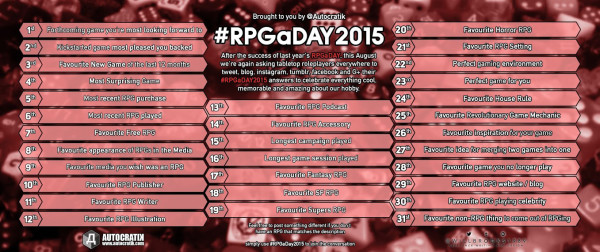The last RPGaDay question for this year asks what was my favourite non-RPG thing to come from RPGing?
The friendships that I’ve made through gaming tops the list for me. Many of my closest friends come out of gaming together through the years. That is something that I would sorely miss if I had not played RPGs.
But, another key non-RPG thing to come out RPGing for me would be who I am today. I started playing RPGs when I was about 10 years old, and for a small, dorky kid, and gaming was perfect for building self-confidence and strength of character. The ability to imagine myself as a powerful dwarf fighter, overcoming all sorts of creatures and adversity, was awesome, but even more than just reading a book and thinking about the idea of it, through RPGs, I was put in difficult situations and had to think and work my way out of them.
There really is no substitute for RPGs in terms of personal capacity-building. I’m sure there’s some study on this somewhere, but role-playing allows you to develop your intellectual and interpersonal capabilities. Intellectually, through games, you have to do the math (no computer does it for you), you develop vocabulary (what game hasn’t taught you at least a few new words?), you need good grammar (coherence is required!), you learn about the world if you play any games set in the real world, including history, geography, cultures and possibly a bit of other languages. You also gain valuable problem-solving skills, having not only to answer a series of “what would you do if…” questions over the course of each gaming session, but also experiencing the consequences of your answers.
These skills, while sometimes found in card, board and electronic games, are always constrained in those games by necessary design. You simply cannot have any possibility in such games, as they would take forever to design. That’s not to say that RPGs are entirely boundless, but their boundaries are far, far wider than anything in any other medium that is so interactive. You are really only limited by what your game master is able to handle.
But, we’re not done yet extolling the benefits of RPGs. Aside from those intellectual abilities, there is also development of emotional and social skills.
At the table, you must interact with other players to a degree rarely found in other games. You must negotiate, cooperate, investigate and all other kinds of interactions, some fun and some serious, but always, you’re interacting with other people and in situations which often have no clear “win/lose” result. There are instead widely varied consequences to each of your interactions, which may be immediate, but also might unfold over many, many sessions.
While some gamers might not excel at these interpersonal skills, my guess is that they would be much further behind socially were it not for the RPGs. I know they helped me break out of my shell and built such confidence I sometimes thought I must be an extrovert.
There’s also the listening skills that RPGs teach you. You’re not listening to an automated system or the “designated” result of a card or board game. You’re taking in information from another human being and that information (unless you’re playing online) is going to include body language, tone of voice as well as content of what is said. You’re learning how to digest all that information, read a person, a situation and then deal with it. Those are invaluable life skills that you just can’t get anywhere else.
I hesitate to say that RPGs are the most valuable form of recreation, but I don’t think I’d be the man I am today had I not taken up those dice so many years ago. Here’s to RPGs!
